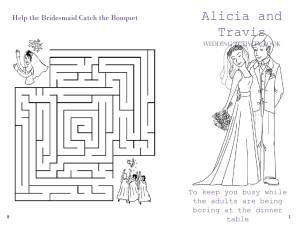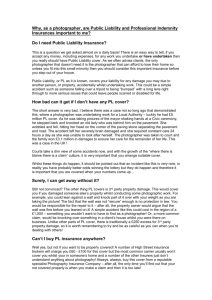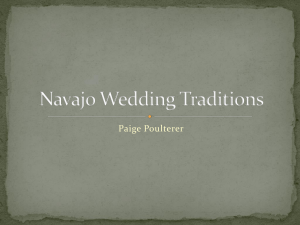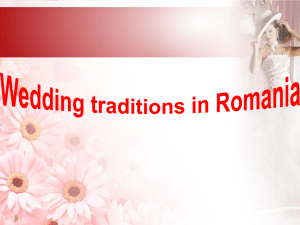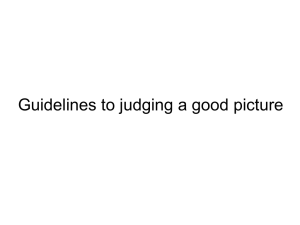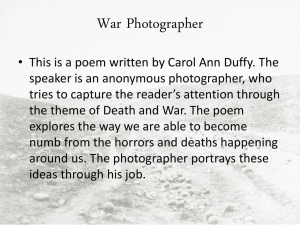DPL Frame to Finish Presentation
advertisement
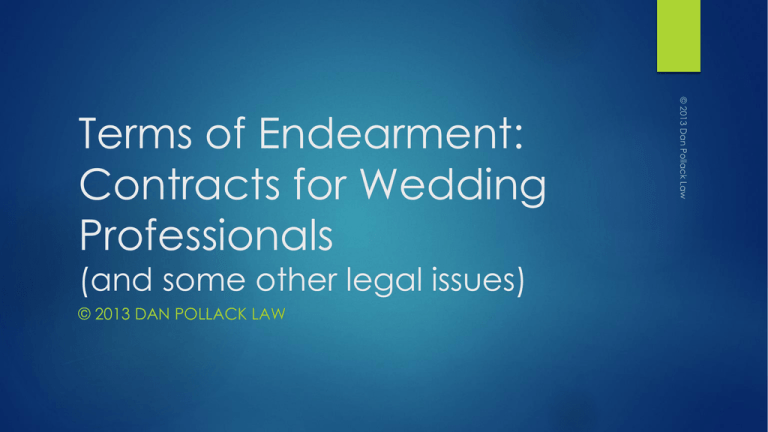
Terms of Endearment: Contracts for Wedding Professionals (and some other legal issues) © 2013 DAN POLLACK LAW Overview Today’s goal: Provide an overview of some key legal issues that you will probably need to address as part of your business. Basic understanding: help you recognize key issues, deal with some of them yourself and know when you may need to speak with a lawyer. Primarily discussing contracts, but will also cover key issues in copyright and other issues including travel and business formation. Where did it all go wrong – Part I Australia lawsuit brought by bride and groom against wedding photographer. Sued him for missing key moments during the wedding, including the big kiss. Photographer claimed it was “just a peck” and that not all moments could be captured. Court sided with photographer on the “kiss” issue, but found that his photographs were sub-par and ordered him to pay $710 of $6,400 claimed in damages. Takeaway: include language about providing you with access to important moments in the agreement; clear communication never hurts; limitation of liability provision in the agreement. Where did it all go wrong? Part II Wedding photographer receives demand letter from the groom’s brother (a lawyer) claiming that the photographer should pay usage fee for each family member who appeared in photos posted on the photographer’s website. Photographer obtained permission to use images on his website from the bride and groom, but not model releases for other guests. Photographer was covered by insurance, but they had to pay on the claim. Takeaways: avoid using images with “unreleased” people on your website or in promotional materials; obtain model releases from bride & groom and possibly “key” guests; good idea to have errors and omissions insurance. Contracts – Use Them Get it in writing - use contracts. Develop a standard contract that you can use for most situations. Worth the effort to save you headaches later. A contract that you understand and know – not reinventing the wheel every time. May need to be modified, but you will know the pressure points. Key Contract Terms: Who & When Sounds obvious, but identify the parties: your name and address (your business if applicable) and their names and addresses. Whether it’s the bride & groom, parents or someone else – make sure that it’s in there, it’s clear and that you can find them. If possible, the agreement should be with bride & groom – it’s their event (okay if someone else pays). Recommend including the date at the top of the Agreement – no ambiguity. Key Contract Terms: Consideration For a legal agreement to binding, there must be consideration – both parties give something of value (e.g., money for services). In general, not an issue in terms of contract validity – you are providing services (photos or video) in exchange for payment and the contract will refer to that exchange. Key Contract Terms: Scope of Services Include a detailed description of what you will provide – delivery package, locations, hours, date, time and location for ceremony and reception (or for other events), “window” time for portraits and group shots, delivery dates and anything else important, such as pre-event consultation, event guide (someone to tell you who is important). Moments to capture – if included, also include language that they must provide you with a reasonable opportunity to capture those moments. Cooperation and communication clause. Creative control – you have it. You choose what pictures you will provide. Exclusive – you are the only professional photographer / videographer – anyone can take a shot, but don’t interfere and don’t take shots of my shots. Plain English – not legalese. Something that you and your client can understand Key Contract Terms: Payment 1. 2. 3. Structure and amount is up to you, but some key points: Refer to the deposit as a “booking fee” – non-refundable, including if wedding is cancelled. Make the amount of the booking fee and the amount due after the event clear and easy to understand with deadlines: non-refundable booking fee of $1.00 due by X date with remaining balance of $1.00 payable within X days after the Wedding Date (should be defined in the agreement). Collection costs: recovery of attorneys’ fees and costs if balance is unpaid and you need to hire someone to help you collect. Other notes: specify whether HST is included – recommend including so that the actual payment amounts are clear and easy to understand. Optional: Include fees for additional services, e.g., additional prints, CDs, overtime. Key Contract Terms: Additional Expenses Refer to them in your agreement and be specific. Meals – you (and your team) get fed. Include additional costs – especially if travel is involved. Okay to include reasonable caps – either a total cap or cap for specific items (i.e., hotel). Include deadlines – X number of days after providing receipts or with the final outstanding balance. Key Contract Terms: Usage Rights What the parties can do with your work. You own the work (copyright) – unless otherwise stated, you own the copyright – recent change in Canadian copyright law for photographers (more later). But still be specific about what you can and cannot do with the images in terms of use (website, promo pieces, portfolio, contests, art exhibitions, display in studio, etc.). Also be specific about what they can do with it – for example, allowed to post work on website, social media, YouTube (or not). In general, personal use and limited reproduction (friends and family) allowed, but client is responsible if work is republished or resold – especially for compensation. Avoid surprises on both sides. Key Contract Terms: Releases Obtain model releases from bride and groom – confirms that you are allowed to use their images for promotional purposes. Incorporate into the agreement. Be careful about using images of other non-released people for promoting your business. Try to get releases if you want to use their images. The model needs to sign – other people can’t sign on their behalf (unless minors) Property releases: generally not as important as model releases, but you might want your client to obtain a property release if you want to use photos of a recognizable location or a private third party residence – client should be responsible. Brands (trademarks): try to avoid using images on your website that have obvious brands. Probably won’t be raised as an issue – not seen as being “negative” – but some brands are very sensitive and strict about control. Some red flag properties and brands: Disney, Coca Cola, Hollywood sign, etc. See here for more: http://www.pacaoffice.org/resources/specialReleases.html Key Contract Terms: Indemnity Indemnification: shield you from liability if a non-party sues you. Not an absolute shield, but it helps. Two important points that need to be included: 1. Shield you from liability caused by your client’s breach. For example, client uses image in a way that breaches the agreement and someone else sues you based on that use. 2. Shield you from liability for any claim relating to the services that you provided under the agreement. Broader than only shielded if your client breaches the agreement. Key Contract Terms: Limitation of Liability Basic idea: even if your client or someone else brings a claim against you, your liability is capped. Common to cap at amount paid for your services, but could be a fixed amount. Legal input helpful – requires some finesse. Additional Provisions Inherent quality: photo and video quality may fade over time. Client releases you from liability for those inherent qualities. Substitute: client option for you to substitute another professional if something unforeseen happens. Include warranty about substitute being a competent experienced professional. House rules: may be limited by ceremony official or site rules. Client accepts applicable impositions and is responsible for negotiations with technical input from you. Guest cooperation: client responsible for conduct of guests and ensuring cooperation of other service providers. Key Contract Terms: “Boilerplate” 1. 2. 3. 4. Refers to the language that you find at the end of most contracts. Some key points: Choice of law and forum – what kind of law will apply and where the parties can sue if there’s a dispute. Not a big deal if you are all local, but important if your client is located somewhere else. Independent contractors – make it clear that you are an independent contractor and not employed by your clients. Probably implied from the context, but still good to include. Will defeat any “work for hire” claim re: copyright ownership. Entire agreement – memorializes that this is the whole agreement. No side deals. Force majeure – the “act of god “ provision. If unforeseen event stops wedding, booking fee is non-refundable. If unforeseen event stops you, either substitute or you return booking fee. Copyright: Basics Copyright exists "in every original literary, dramatic, musical and artistic work" Copyright provides you with the exclusive right to prevent others from copying your work. It happens automatically from when the work is created. Low threshold for originality – “more than trivial or mechanical intellectual effort” – doesn’t need to be “great” or a work of art. Almost any photo or video satisfies the threshold. Universal standard. Term – 50 years after the life of the author. (70 in USA) Registration – not required in Canada. In the US, required to obtain certain remedies. Copyright © notice – not required, but a good idea. Also some form of watermark. Copyright: Removal of “Portrait Exception” As part of the 2012 amendments to the Copyright Act (referred to as the Copyright Modernization Act), law was changed to make commissioned photos the same as any other copyright-protected work. Before: in general, creator of work is the owner of the copyright, but there was an exception for “engravings, photographs or portraits” that are commissioned (i.e., photos for weddings, family portraits, etc.) that in the absence of an agreement to the contrary, the first owner is whoever commissioned the work. Now: exception eliminated so that photographers who create these categories of works are treated like all other authors. The onus is now on consumers to contract for copyright ownership (with exceptions that allow for non-commercial uses). Recommendation: not required to refer to copyright ownership in your agreement, but you should anyway. Copyright: Moral Rights Moral rights include the right of attribution – the author's right to be associated with the work by name and the right to remain anonymous, and include the right to the integrity of the work (the right to stop the work from being distorted, mutilated or modified, to the prejudice of the author's honour or reputation, or from being used in association with a product, service, cause or institution). Protected under the Copyright Act of Canada and not assignable. Be clear in your agreement about what kind of attribution you want. Your client probably doesn’t want copyright notices all over their wedding album, but you should include the required form of attribution / watermark if they want to use your work on the Internet. Copyright Infringement Unauthorized use of your images or video – by your client or by a third party. Internet – once it’s there it’s hard to stop – right click on Google. Use watermark and/or copyright notice. Policing tools for images: Tin Eye and Google. Google is probably the easiest tool to use: http://www.google.com/insidesearch/features/images/searchbyim age.html Reports websites where your image is being used. Enforcement tools: demand letters, DMCA takedown in the USA, but you should speak with a lawyer in the applicable jurisdiction if you are seeking compensation or something more than just telling them to remove the image or video. Copyright: Music in Videos Videographers have more copyright-related issues to consider – primarily music. SODRAC (collective licensing agency) – clear sync rights if work in their repertoire. May need to obtain from rights holder – start with music publisher. YouTube and other services: trend toward monetization and away from lawsuits Request permission – essentially, I am making a video that will not be offered for sale or rebroadcast and would like to use your song. Use a cleared work and dub it into the video – remove a “famous” song for a work where you have obtained the rights. Amendment to Canadian Copyright Act: “YouTube” exception to infringement for non-commercial user generated content. Must be non-commercial, provide attribution if reasonable, grounds to believe you weren’t infringing, and does not have substantial adverse affect on market for pre-existing work. No case law yet. May not apply if you put the video on your own commercial website. Probably applies more to your client’s use of the work. Copyright: A Final Word About Litigation Enforce your rights – most cases don’t go to Court, but understand that litigation is stressful, time-consuming and expensive for both sides. Be firm, but be reasonable. Avoid histrionics and overly aggressive language. Damages are not easy to establish. May not be a “windfall” unless you can show that the defendant acted in “bad faith” and that you are entitled to statutory damages. Other Issues: Travel for Destination Weddings Check the consulate of the country that you are visiting and ask for the rules and regulations for taking professional equipment into that country. Many countries have restrictive “protectionist” rules covering this kind of work. Forms are often available where you can register your equipment – avoid potential seizure at the border. Generally not liable for paying taxes if you have been paid in Canada, but worth looking into with your accountant. USA: need to apply for a temporary non-immigrant worker visa. Other Issues: Corporate Form Options include: sole proprietorship, incorporation and limited liability company. Disadvantages to incorporation / LLC: more expensive and complicated. Advantages to incorporation / LLC: personal liability, taxes. Speak with your accountant, but in general, look to some form of incorporation if you’re business is growing in size and scope (e.g., hiring people). Questions Dan Pollack Law dan@danpollacklaw.com www.danpollacklaw.com (416) 356-5292
